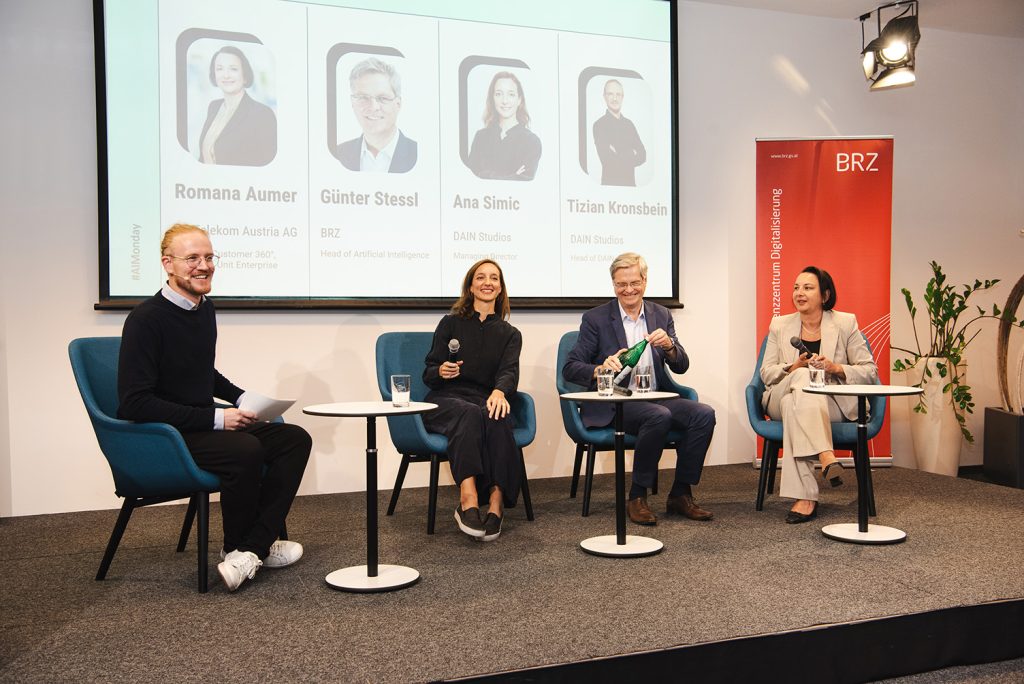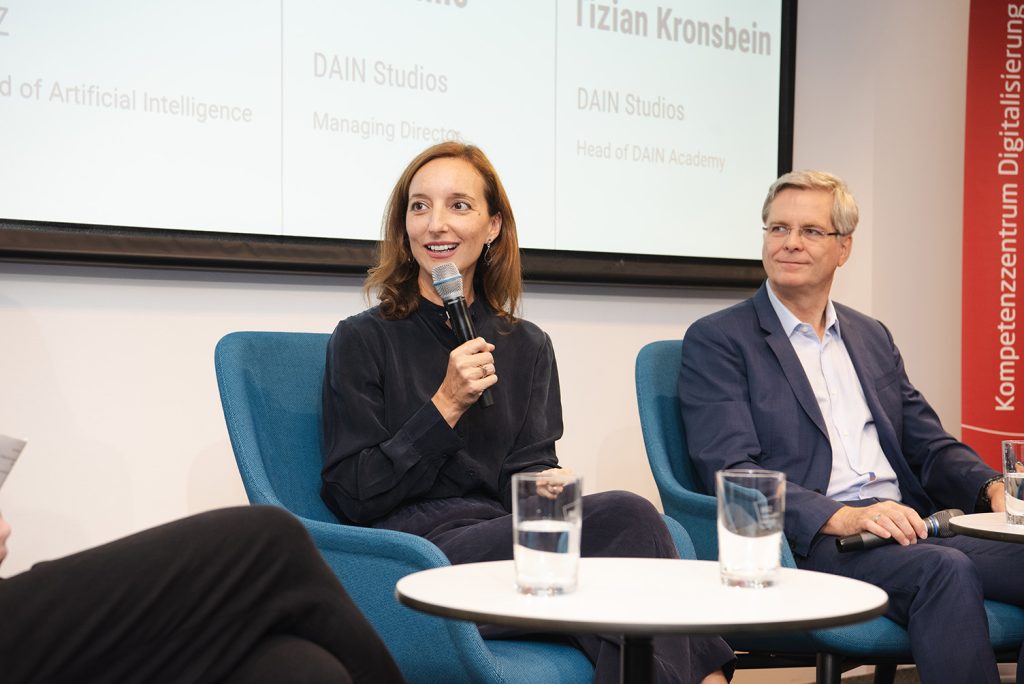AI literacy is an “ongoing learning experience” nobody should ever assume to be complete, Tizian Kronsbein, Head of DAIN academy and the host of the very first AI Monday in Vienna, cautioned at the very start of a lively panel discussion. Even in the age of artificial intelligence (AI), human intelligence would continue to play a key role. Users would remain responsible for ensuring the socially meaningful and ethically correct use of AI – which is why they had to progress from data to AI literacy.
In front of 70 live guests at the Austrian government’s Federal Computing Centre (BRZ) and 130 online viewers, the compère stated that every historical leap in automation – from water to steam power, for example, or from computers to robots – had not freed humans from taking responsibility for the output of their machines. Where the first industrial revolution had steam-powered human ingenuity, the AI age would bring “more and more human-machine collaboration” – creativity driven by human skill in working with AI.
All three of the AI Monday panelists viewed AI literacy as a natural evolution from data literacy, which is already widespread in the workplace. Romana Aumer, Head of Customer 360° at the Enterprise Business Unit of A1 Telekom Austria AG, admitted her switch from finance and its focus on a company’s past performance to forward-looking AI had been a ”steep change”. But she agreed with Günter Stessl, Head of AI at the BRZ, who pointed out that many of his colleagues’ had in recent years “progressed smoothly” to AI literacy.
He went on to identify data governance – an established discipline to ensure companies and other organizations work responsibly with big data – as a useful anchor for such a “step-by-step process.” Akin to this practice, “trustworthy AI” emphasized data quality, for example, to train algorithms as well as possible. “These are important issues for AI […], not least to identify possible risks well in advance.” To catch snags in potentially fraught AI projects, the BRZ now has a roster of questions to find “answers to possible difficulties” at an early stage.
Ana Simic, Managing Director of DAIN Studios Austria, underlined that AI literacy could also be driven by continual open-minded exchanges between an organization’s business and tech experts. A “culture of trust and experimentation” could foster pleasant surprises. Even as a consultant, she said she was not afraid to admit learning “something new every day” this way.
All three experts agreed that the ability to approach business processes from the get-go with a view to leveraging data and AI was crucial for developing user-friendly applications. Aumer recalled how AI had helped A1 Telekom Austria‘s B2B division to radically improve new-product marketing. Instead of “pushing innovations into the market”, salespeople could now “approach the right customer at the right time”, offering them exactly what they were looking for at that moment. Data science has allowed the company to “set new priorities.”
“As a use case, this kind of knowledge management is right at the top of the list,” Simic said. AI was an obvious boom to knowledge workers by making information retrieval ever faster. Service staff visiting customers could, for example, offer better and faster service. Stessl noted that the “broad range” of AI “ideas bubbling up” had shifted the public away from the “Terminator image” of a supposedly threatening technology. For example, AI-powered language simplification was now recognised as a major contribution to a barrier-free society.
The European Union’s upcoming AI regulation would also help “dispel fears about the field,” Simic said. New rules would “allow the European AI industry to innovate more” – not less, as some observers near and far are professing. However, Stessl said the planned AI Act should be seen more as “start-up help” than “a magic bullet”. Rapid technological advances meant Europe would have to keep working on its rules for the use of AI. “This will be a major collective task,” Stessl said. “What do we want – and what do we not want [from AI]?“
Ideally, Europe‘s AI legislation will create a solid regulatory framework “upon which we can build,” said Aumer. One central motivation was to make AI safe enough to allow people living in Europe to accept an AI-assisted future. The trio of experts agreed this could only happen after an honest look at the future of work. Yes, AI would take over tasks carried out by humans. But this development was not new to the history of automation – machines had always taken over human tasks and humans had always found new things to do instead.
This was not the only reason why AI Monday’s Vienna debut ended on an optimistic note. Pointing to technological progress over the last decade, Aumer expressed the hope that AI guided by humans could significantly help fight the climate crisis. Simic said AI has the potential to help needy members of society more than the strong – and so reduce the gap between educated and uneducated, rich and poor. Humankind had the chance to achieve more. “We live in a world full of problems. Maybe now we have more time to solve them.”

